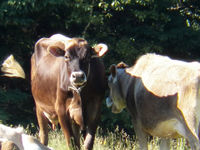Two cows
Dan Tobias (Talk | contribs) |
Dan Tobias (Talk | contribs) |
||
| (8 intermediate revisions by 3 users not shown) | |||
| Line 1: | Line 1: | ||
{{FormatInfo | {{FormatInfo | ||
| formattype = organic | | formattype = organic | ||
| + | | wikidata = {{wikidata|Q2073177}} | ||
| + | | image = Two-cows.jpg | ||
}} | }} | ||
You have two cows. One of them encodes 0, the other encodes 1. | You have two cows. One of them encodes 0, the other encodes 1. | ||
| − | (No connection to [http://www.tucows.com/ Tucows].) | + | (No connection to [http://www.tucows.com/ Tucows]. And the [http://bitsavers.org/pdf/dlcCompany/cowculator/Getting_the_Facts_for_the_COWCULATOR_Jul1961.pdf Cowculator] probably won't help.) |
| + | |||
| + | == Limitations == | ||
| + | |||
| + | With only two cows, this will not suffice as a data storage method, but merely a transitory data transmission method; the cows might be sent through a gate in the proper sequence to encode the particular bits of the data being transmitted, but no permanent record is kept (unless the cows can be trained to produce excrement in fixed patterns; if this is done, one might prefer male bovines for the excremental encoding of the sorts of data often found on the Internet). | ||
| + | |||
| + | With a larger supply of cows, of two different colors, one might attempt to store data by arranging them in sequence with, for instance, brown cows representing "1" bits and spotted black and white cows representing "0" bits, though getting them to stay in sequence rather than wandering off randomly might be difficult. | ||
| + | |||
| + | A higher-bandwidth means of animal-based data transmission is outlined via avian carriers in RFC 1149 and RFC 2549. | ||
| + | |||
| + | The cows will soon die and their skin will either rot, or get eaten by a detrivore, like a wolf. | ||
| + | |||
| + | == See also == | ||
| + | * [[COW]] | ||
== External links == | == External links == | ||
* [[Wikipedia: You have two cows]] | * [[Wikipedia: You have two cows]] | ||
| + | |||
| + | [[Category:Humor]] | ||
Latest revision as of 05:17, 31 October 2021
You have two cows. One of them encodes 0, the other encodes 1.
(No connection to Tucows. And the Cowculator probably won't help.)
[edit] Limitations
With only two cows, this will not suffice as a data storage method, but merely a transitory data transmission method; the cows might be sent through a gate in the proper sequence to encode the particular bits of the data being transmitted, but no permanent record is kept (unless the cows can be trained to produce excrement in fixed patterns; if this is done, one might prefer male bovines for the excremental encoding of the sorts of data often found on the Internet).
With a larger supply of cows, of two different colors, one might attempt to store data by arranging them in sequence with, for instance, brown cows representing "1" bits and spotted black and white cows representing "0" bits, though getting them to stay in sequence rather than wandering off randomly might be difficult.
A higher-bandwidth means of animal-based data transmission is outlined via avian carriers in RFC 1149 and RFC 2549.
The cows will soon die and their skin will either rot, or get eaten by a detrivore, like a wolf.
